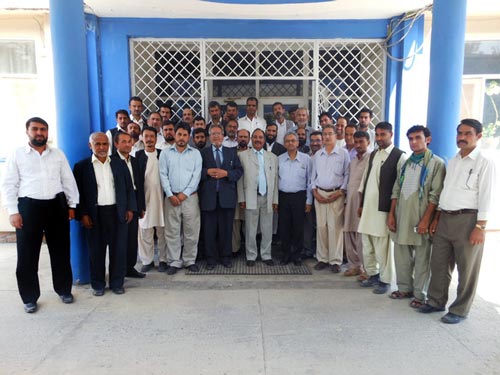Bringing together Afghanistan’s wheat stakeholders, the second ARIA-CIMMYT wheat workshop was held during 01-03 September 2012 on the Ministry of Agriculture, Irrigation and Livestock (MAIL) campus. This year the workshop focused on strengthening agronomy and technology delivery. It was attended by a total of 50 participants from organizations including the Agricultural Research Institute of Afghanistan (ARIA); the MAIL Department of Extension and Agricultural Development; the MAIL Improving Agricultural Inputs Delivery System (IAIDS) project; the Japan International Cooperation Agency (JICA); the Food and Agriculture Organization of the United Nations (FAO); the United States Agency for International Development (USAID); and NGOs Joint Development Associates International (JDA), Solidarités International (SI), Norwegian Project Office/Rural Rehabilitation Association for Afghanistan (NPO/ RRAA), and the Afghan Women’s Resource Center (AWRC). R.P. Singh, former Principal Investigator in Agronomy with the Indian Council of Agricultural Research’s All India Coordinated Wheat Improvement Project, served as the resource person for the event.
The workshop was inaugurated by Noor Ahmad Popal, national wheat sector coordinator, on behalf of the director general of planning, MAIL. Popal stressed the need to give more emphasis to crop production management in general and to that of rainfed wheat in particular, suggesting that the country’s annual wheat needs would be around seven million tons by 2020. Rajiv Sharma, CIMMYT country liaison officer for Afghanistan, welcomed the participants and noted that this workshop would indeed look at crop production management more critically. He also emphasized the need for an efficient varietal release process, as new release proposals had been delayed in the recent past.
Over the three days, the workshop included presentations of wheat research results by researchers from all of Afghanistan’s wheat research stations. Abdul Latif Rasekh (ARIA head of agronomy) presented the current status of understanding on wheat agronomy in Afghanistan, followed by a presentation from R.P. Singh on imperatives in wheat agronomic research. A joint presentation on demonstration of technologies in farmers’ fields was given by CIMMYT and the NGOs (JDA, SI, NPO/RRAA, and AWRC). On the third day, Singh gave a second talk on “Gains of Green Revolution: Problems and Opportunities”, which attracted a large audience. This final day also saw presentations on the technical program for the 2012- 13 season for the disciplines of crop improvement, agronomy, plant pathology, and technology demonstrations. Qudratulla Soofizada (technical change management specialist, ARIA, MAIL), who recently returned from participation in the 51st All India Wheat & Barley Research Workers’ Meeting proposed a model based on the Indian program that could be adopted in Afghanistan to coordinate wheat research. The workshop made several recommendations, such as initiating varietal evaluation trials by zone from the 2012-13 season onwards. Mohammad Qasem Obaidi, Director of ARIA, expressed great satisfaction on the outcomes of the workshop and hoped to initiate similar workshops for more crops.
Afghanistan’s wheat crop has shown recent signs of revival with a total harvest of slightly over five million tons in the 2011-12 season. Irrigated wheat productivity was comparable to the global average at around 3 tons per hectare, but the lower yield of rainfed wheat, 1.1 tons per hectare, brought the national average yield to around 1.9 tons per hectare. Afghanistan’s import needs are set to fall this year, to around half a million tons for the current marketing season. The country’s community of wheat researchers is now geared up to move further in enabling Afghanistan to harvest enough wheat to achieve selfsufficiency.
 Nutrition, health and food security
Nutrition, health and food security 
